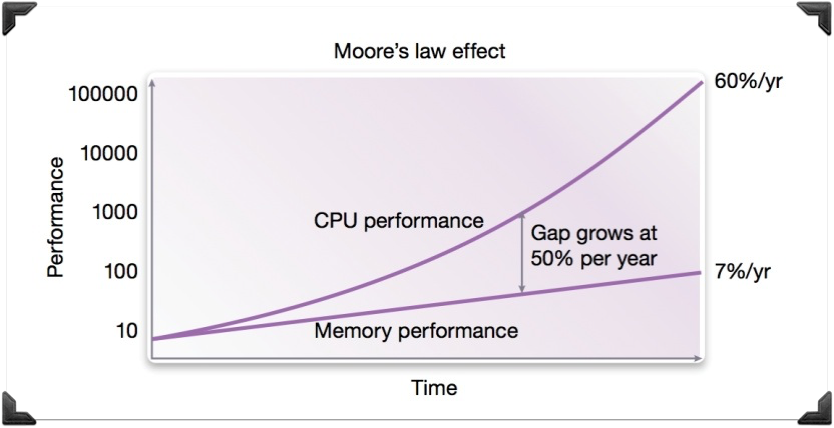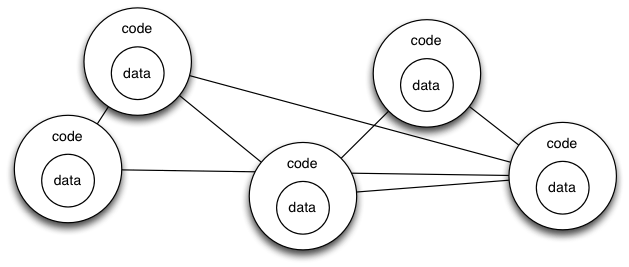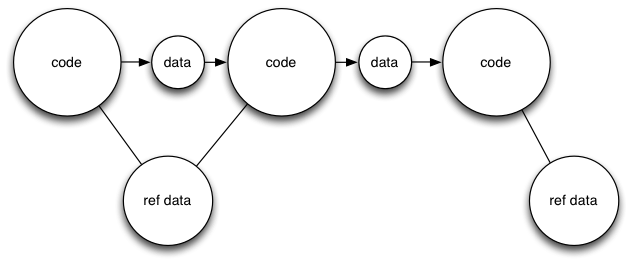C++ is fast. It’s a good fit for games. It’s certainly faster than Ruby. However, there’s a better fit for game development. It’s called C.
This isn’t an April Fool’s joke. Look at what happened to the Sol Trader history system when I ditched the slow C++ version and rewrote it in optimised C. The line count is also about 20% reduced.
C++ code can be fast, but the way C++ is commonly used and the language features that it promotes can get in the way of this goal. Here are a few things I’ve learnt about C++ that are essential for anyone to know who wants to write modern performant code.
Memory access is slow
In case you hadn’t realised: compared to your CPU, your memory is slow. Very slow. It’s probably the thing that’s most holding your CPU back right now.
Memory has been gradually increasing in speed over the last few decades, but at 10% of the rate of CPU speed:

Memory cache misses cause the CPU to stall, losing several hundred cycles each time it happens. Every year, cache misses become a more and more significant cause of CPU slowdown.
With the previous version of the history generation, using classic object oriented patterns, my data was all over the place. I had hundreds of little objects all encapsulating their own data, using virtual method calls to access tiny pieces of it.
I moved to arrays of values, storing references to other objects via indexes everywhere. I moved all the string processing right out of the generation engine, so that the engine was only dealing with small data structures of perhaps 20-30 bytes at a time.
Virtual function calls are slow
A virtual function is one that changes it’s behaviour depending on the type of the object. For example, if we use an interface in C++, we create an abstract class with some virtual functions attached to it. We then derive our class from this interface, passing pointers of the interface type around our program. When our program calls the interface function, the program is able to work out which method to call on the derived object, based on extra information that’s kept in our object.
So far, so good. Except virtual functions are slow for the same reason that the memory is slow. With virtual methods, the right method to call can only be decided at run time, and there’s normally one or two cache misses for these method calls. The compiler is constrained about what it can do to make this quicker. It might not seem like much, but it stacks up for inner loops.
Back in 2002, when I was working in the games industry, I lambasted the PS2 to my fellow AAA games developers for not even supporting virtual pointer tables, meaning that virtual functions were impossible. In deriding the platform I showed my ignorance about the speed trade offs that smarter people than me were making. It turns out that the constraints of the PS2’s architecture changed the face of games development for the better.
A few virtual calls aren’t going to massively slow down a codebase. However, my code was a mass of tiny virtual calls for trivial operations. Parts of my code were iterating over every entity in the game with at least three or four chained virtual function calls each time!
In the new version of the code, I cut out all the virtual methods completely, sticking to bare C++ method calls. I inlined a lot of these, leaving the game with fewer longer methods but without the need for the CPU to constantly be jumping around to figure out what to do.
Templates are slow (to build)
Templates were introduced to C++ in order to help make parts of the code generic with respect to type. For example, the supplied vector type in C++ is a template type, meaning that we can store multiple different types of objects in the same data structure. This allows us to seperate two concerns: the way the object is stored and how it works, which partitions complexity for our minds.
Templates reduce the number of lines of code in our programs. They are harder to understand when reading them later, but the bigger disadvantage is that they slow down build time. The compiler has to effectively copy all the code each time for each template and do a lot of processing in order to produce efficient executables out of them.
By cutting out all the templates from my code (including all uses of the C++ Standard Template Library), I’ve cut down the full build time of the entire game to about 4 seconds. With a debug loop as short as this, I barely have time to sip my tea before I’m testing the code I just wrote, and I can change headers without having to wait 10 minutes for a new build to compile.
Encapsulation can be unhelpful
Encapsultation is the packing of functions and data into one component. It is one of the fundamental concepts behing Object Oriented programming.
Much of encapsulation in C++ (and other OO languages) is promoted through the use of classes with private members to hide data from outside code.
Promoting encapsulation is held up as a pillar of good code design. However, I think we might be doing encapsulation wrong. I don’t think encapsulation should be at the class or method boundary, but at the data boundary.
Essentially I’m advocating a switch from this style of coding:

To this style:

It’s important to get our architecture right. We encapsulate concepts in the correct sections of our program and ensure data flows well through the various pieces. If we use simple value objects (perhaps arrays of data) as the handoff between different sections of our program, calling methods that transform data between different types, then our code becomes more isolated and easier to reason about. It’s also far easier to parallelise.
Incorrect encapsulation is worse than no encapsulation at all. Hiding data behind code limits what the calling code can do. Those constraints can be helpful, but they can also hinder us. If we get the architecture right and use data structures to provide bounded contexts to our code, rather than layers of method abstraction, then we have less need to hide our data from others.
By rearchitecting my application to not require callbacks at all, I’ve made it simpler to test and debug. There’s less code reuse, but inevitably the concepts I thought were duplicated were actually subtly different. I’m also treating the data in batches, looping through arrays of small amounts of data rather than arrays of objects. Rather than one big loop bouncing up and down the layers of abstraction for each object (exacerbating the method call overhead, which is further increased if we are using virtual methods), I have multiple loops doing one small stage of data transformation each time.
There are no methods in classes: it’s all public structs and functions. I still have encapsulation, because each stage of data transformation is distinct from the others, but I’ve no need to hide my data behind code.
Summary
There are some bits of C++ I find useful. Operator overloading is helpful to clean up verbose code, for example. I still compile my ‘mostly C’ code using a modern C++ compiler.
It’s the paradigms that C++ promotes and supports through its language features that aren’t for me, and I’ve doubled the speed of my code as a result.
Check out my indie game Sol Trader, an epic space action adventure. Be part of a living society you can befriend, understand and manipulate to your own ends.
Follow
